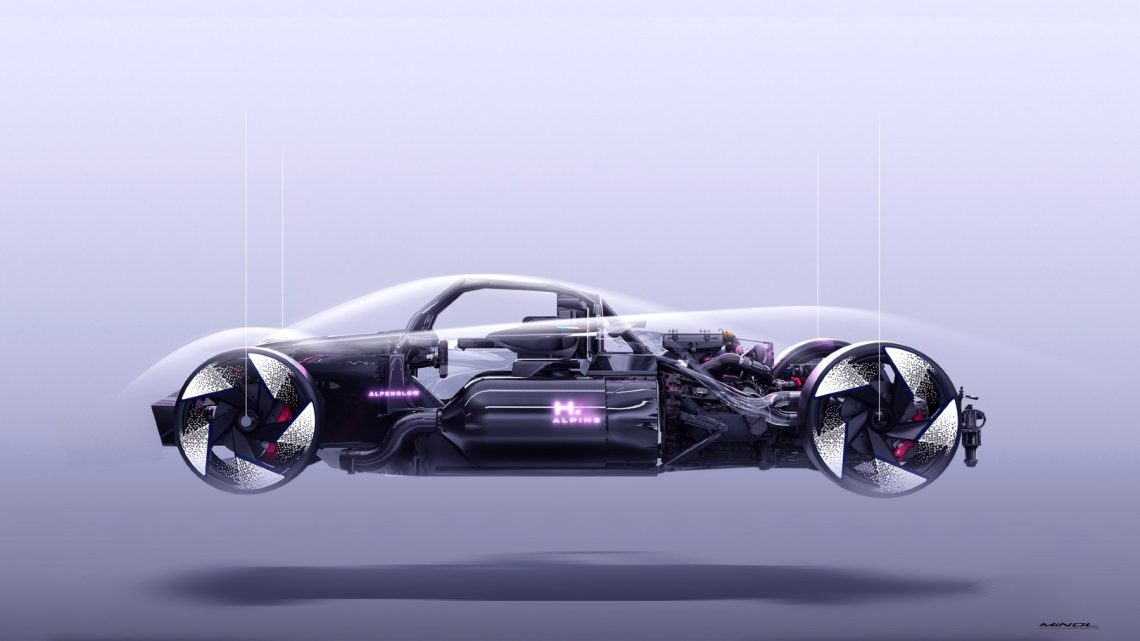
This double-hydrogen engine uses a curious gas: 340 hp and a detail that no one can explain
May 25, 2024Some car manufacturers believe it’s too soon to write off the internal combustion engine. Toyota, for instance, is confident that it can be adapted to burn hydrogen instead of fossil fuels, significantly reducing emissions. Alpine is also joining those who are making engines more sustainable.
Alpine’s new development
Meanwhile, Alpine is developing a hydrogen-powered engine, exemplified by their new Alpenglow Hy4 hypercar, which features this advanced power plant. These efforts demonstrate a commitment to finding innovative solutions that can extend the life of internal combustion engines while addressing environmental concerns.
Additionally, these manufacturers are exploring other cutting-edge technologies to enhance engine efficiency and reduce carbon footprints. Hybrid systems that combine traditional engines with electric motors and advancements in engine materials and design are part of this multifaceted approach. By continuing to innovate, these companies aim to balance performance, sustainability, and the evolving demands of the automotive industry, ensuring that internal combustion engines remain relevant in a greener future.
The latest innovation is an evolution of the static Alpenglow concept car from 2022. This hydrogen-powered hypercar features a 2.0-liter engine producing 340 horsepower. The four-cylinder engine runs on hydrogen stored in three tanks, each holding about 8 kg of hydrogen at a pressure of 700 bar.
More than hydrogen-powered engines
Alpine is also developing a more powerful engine. French engineers are working on a new V6 engine designed to run on hydrogen. This advanced engine is expected to power the following variant of the Alpenglow, likely to be named the Hy6, which is set to debut in late 2024.
In addition to the hydrogen-powered engines, Alpine is exploring advancements in lightweight materials and aerodynamics to enhance the performance and efficiency of their vehicles. The company aims to combine cutting-edge technology with sustainable practices, positioning itself at the forefront of the green automotive revolution. By focusing on hydrogen as a clean fuel source, Alpine contributes to reducing greenhouse gas emissions while maintaining high performance and driving excitement.
Alpine has entrenched itself in hybrid racing, with a notable presence in Formula 1, where hybrid technology reigns supreme, and in endurance racing (WEC), where it recently entered the Hypercar category alongside industry heavyweights like Peugeot, Porsche, and Ferrari. Looking ahead, Alpine is exploring the potential of hydrogen-fueled combustion engines, aiming to preserve the beloved engine noise and vibrations cherished by fans and drivers alike.
Currently, Alpine asserts its focus on technology acquisition through the development of the Alpenglow and its engines, including the collaborative effort with Oreca for the 4-cylinder engine and the forthcoming 6-cylinder. The Alpenglow prototype, designed with driving performance in mind rather than mere display, hints at its potential role in the proposed 2027 H2 category, as the Automobile Club de l’Ouest suggested.
Potential for the future
Bruno Famin, VP of Alpine Motorsports, addresses the potential of hydrogen in endurance racing and F1 and underscores its significance in decarbonizing future generations of racing cars. The Alpenglow prototype serves as a pioneering laboratory for the development of hydrogen engines, paving the way for future innovations.
Renault’s steadfast support for the project is evident. Key figures, including Renault CEO Luca de Meo and Chief Design Officer Laurens van der Acker, are featured on a plaque inside the car, highlighting the company’s commitment at the highest echelons.
As for strategy, Alpine reserves hydrogen engines for competition and potentially sports cars while continuing its electrification agenda. On the other hand, Renault Group is directing its efforts towards hydrogen combustion engines for high-power commercial applications. Much progress has been made, and it seems there will be more progress. Let’s see how far they go.



 With over 15 years of reporting hydrogen news, we are your premier source for the latest updates and insights in hydrogen and renewable energy.
With over 15 years of reporting hydrogen news, we are your premier source for the latest updates and insights in hydrogen and renewable energy.
It would be the best advantage to have combustible engine’s to run on hydrogen
The best of our future is designed technically to the best outcome continue far ahead congratulations to all engineers in that progress.
At $36 a kilogram for hydrogen, too pricey! Need to first of all, stop the price gouging for Hydrogen.
It’s only expensive because there is no utility-grade H2 storage.
There’s no storage because that adversely impacts natgas sales and power wheeling revenues to the Private Utilities.
H2 stores cheaply as H2/natgas <15% blends, in oil wells or salt domes. Access denied.
Off-peak renewables are usually $15-$30/MWHr. Peak rates are $350 to $750/MWHr. Electrolysers and existing thermal generation routinely allow "round trip" efficiencies of 40%. 10 MWHrs off peak net $150-$300. 4 MWHrs sold at peak net $1400 to $3000. See why the Utilities don't want you to play in their sandbox? PGE pays me $30/MWHr for power they later sell back at $350. Who wrote those rules, any guesses?
Hydrogen engines use air for combustion. So NOX emission will continue . The profile may change depending on the combustion temperature of Hydrogen visavis fossil fuels.